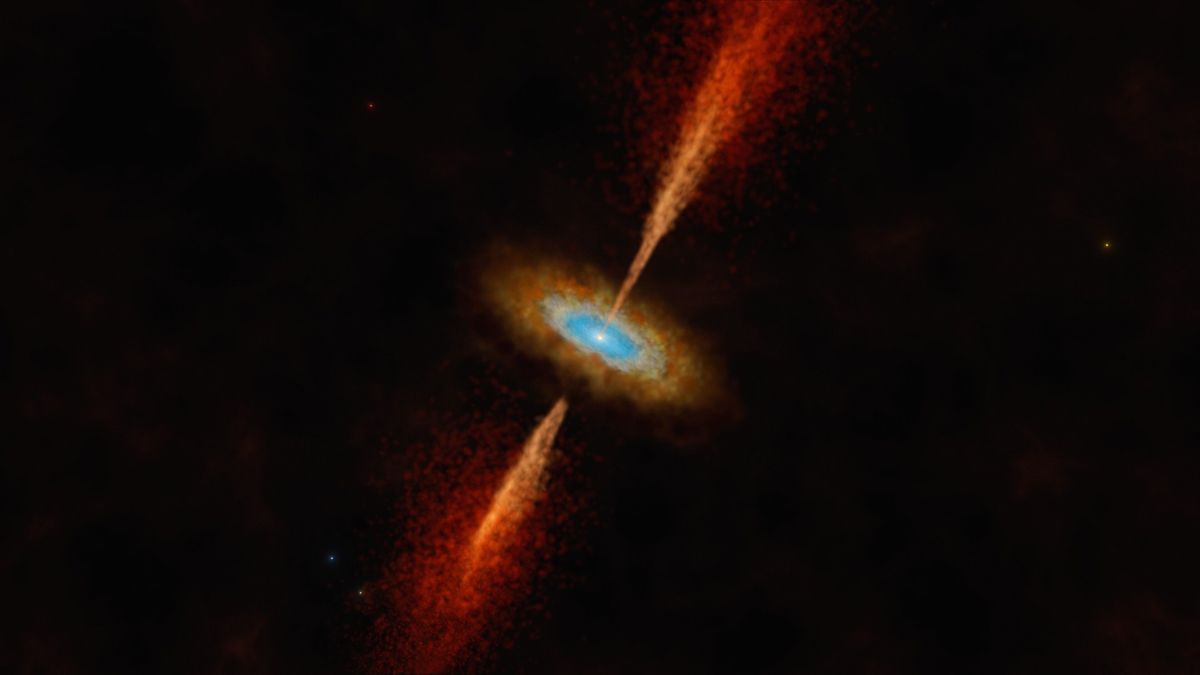Science
Related: About this forumScientists just found a planet-forming disk beyond our Milky Way for the 1st time -- yes, they're thrilled
By Robert Lea published about 8 hours ago
"We know discs are vital to forming stars and planets in our galaxy, and here, for the first time, we're seeing direct evidence for this in another galaxy."
Astronomers have discovered the first example of a swirling disk of material feeding a young star located in a galaxy outside the Milky Way. The disk is near-identical to those found around infant stars in the Milky Way and suggests that stars and planets form in other galaxies just as they do in our own.
The young star in question is located in the Large Magellanic Cloud — a neighboring galaxy to the Milky Way located 160,000 light-years away — and its system, designated HH 1177, is embedded in a massive cloud of gas.
The team behind this discovery observed the system with the Atacama Large Millimeter/submillimeter Array (ALMA), the largest astronomical project on Earth consisting of 66 antennas in Northern Chile that make up a single radio telescope.
"When I first saw evidence for a rotating structure in the ALMA data, I could not believe that we had detected the first extragalactic accretion disc. It was a special moment," researcher lead author and Durham University scientist Anna McLeod said in a statement. "We know discs are vital to forming stars and planets in our galaxy, and here, for the first time, we're seeing direct evidence for this in another galaxy."

More:
https://www.space.com/planet-forming-disk-young-star-1st-outside-milky-way-galaxy

Permanut
(7,864 posts)This one sounds like finding a needle in a mighty big haystack.
Judi Lynn
(164,039 posts)Ashley Strickland
By Ashley Strickland, CNN
4 minute read
Published 10:38 AM EST, Thu November 30, 2023
For the first time, astronomers have glimpsed a young star outside the Milky Way galaxy that’s ringed by a dense disk where planets may form.
The massive star, called HH 1177, and its rotating disk were spotted in the Large Magellanic Cloud, a neighboring dwarf galaxy that’s about 160,000 light-years away. The unprecedented find could help scientists gain a better understanding of star and planet formation.
A newborn star grows in size by pulling in matter from its surroundings. The gas and dust accumulate in a flat disk around the star, known as an accretion disk, as a result of strong gravitational forces. The spinning disk transports the matter onto the star, which gets increasingly larger. The greater the star’s mass, the more powerful its gravitational field becomes, thereby pulling more gas and dust into the disk.
A colossal star such as HH 1177 lives fast and die young, forming more quickly and only having a life span that’s a fraction of that of a star like our sun. This shortened timeline makes the early stages of a massive star hard to observe in our galaxy, as both the star and its disk is hidden from view by the dusty material from which it forms.
More:
https://www.cnn.com/2023/11/30/world/first-extragalactic-disk-scn/index.html